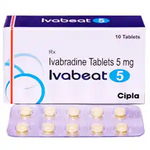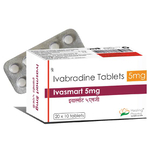ivabrad
Introduction to Ivabrad:
Ivabrad is a medication primarily used to manage certain heart conditions, specifically chronic heart failure and stable angina. It works by reducing the heart rate, thereby decreasing the heart's workload and oxygen demand. This medication is particularly beneficial for patients who cannot tolerate beta-blockers or require additional heart rate control. Ivabrad is available in tablet form and is taken orally. It is essential to follow the prescribed dosage and schedule to ensure optimal results and minimize potential side effects.
Composition of Ivabrad:
The active ingredient in Ivabrad is Ivabradine, present in a 7.5mg dosage per tablet. Ivabradine functions by selectively inhibiting the If current in the sinoatrial node, the heart's natural pacemaker. This action leads to a decrease in heart rate without affecting myocardial contractility or ventricular repolarization. By lowering the heart rate, Ivabradine helps reduce the heart's oxygen demand, making it effective in managing heart conditions like chronic heart failure and stable angina.
Uses for Ivabrad:
- Management of chronic heart failure with reduced ejection fraction.
- Treatment of stable angina pectoris in patients with normal sinus rhythm.
- Used when beta-blockers are not suitable or insufficient for heart rate control.
Side Effects of Ivabrad:
- Bradycardia (slow heart rate)
- Headache
- Dizziness
- Visual disturbances (phosphenes)
- Fatigue
- Increased blood pressure
Precautions for Ivabrad:
Before starting Ivabrad, inform your doctor about any existing medical conditions, especially liver problems, heart rhythm disorders, or low blood pressure. Pregnant or breastfeeding women should consult their healthcare provider before using this medication. Avoid grapefruit juice while taking Ivabrad, as it can interfere with the drug's metabolism. Regular monitoring of heart rate and blood pressure is recommended during treatment. Do not abruptly stop taking Ivabrad without consulting your doctor, as it may worsen your condition.
Conclusion:
Ivabrad is an effective medication for managing specific heart conditions by reducing heart rate and decreasing oxygen demand. It is crucial to adhere to the prescribed dosage and follow all medical advice to ensure its effectiveness and minimize potential side effects. Always consult your healthcare provider before making any changes to your medication regimen. With proper use, Ivabrad can significantly improve the quality of life for individuals with chronic heart failure or stable angina.

















.svg)
